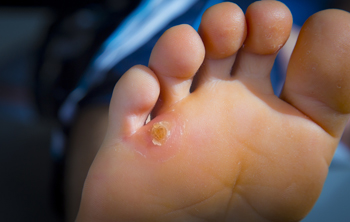 When walking or standing for long periods of time, certain areas of the skin on the feet thicken to help withstand pressure. These areas of thickness are either corns or calluses that work as a protective measure when the skin rubs on the bone, shoe or the ground. Calluses are larger, more irregularly shaped areas of hardened skin on the foot that usually indicate an issue such as a bone deformity, poor walking style, or poor footwear. Corns are much smaller and have a central core. There are five main types of corns that can develop on the feet. Hard corns are concentrated to the size of a pea, and soft corns develop similarly and usually appear when the skin is moist from sweat or in between the toes. A seed corn is very tiny and can occur by itself or as a cluster. Vascular corns contain nerve fibers and blood vessels and are very painful. Fibrous corns attach to deeper tissues and tend to last a long time on the foot. If you have a corn or callus that is irritating your foot, consulting with a podiatrist is suggested.
When walking or standing for long periods of time, certain areas of the skin on the feet thicken to help withstand pressure. These areas of thickness are either corns or calluses that work as a protective measure when the skin rubs on the bone, shoe or the ground. Calluses are larger, more irregularly shaped areas of hardened skin on the foot that usually indicate an issue such as a bone deformity, poor walking style, or poor footwear. Corns are much smaller and have a central core. There are five main types of corns that can develop on the feet. Hard corns are concentrated to the size of a pea, and soft corns develop similarly and usually appear when the skin is moist from sweat or in between the toes. A seed corn is very tiny and can occur by itself or as a cluster. Vascular corns contain nerve fibers and blood vessels and are very painful. Fibrous corns attach to deeper tissues and tend to last a long time on the foot. If you have a corn or callus that is irritating your foot, consulting with a podiatrist is suggested.
If you have any concerns regarding your feet and ankles, contact Dr. Dean D. Hinners of Illinois. Our doctor will treat your foot and ankle needs.
Corns: What Are They? and How Do You Get Rid of Them?
Corns can be described as areas of the skin that have thickened to the point of becoming painful or irritating. They are often layers and layers of the skin that have become dry and rough, and are normally smaller than calluses.
Ways to Prevent Corns
There are many ways to get rid of painful corns such as wearing:
- Well-fitting socks
- Comfortable shoes that are not tight around your foot
- Shoes that offer support
Treating Corns
Treatment of corns involves removing the dead skin that has built up in the specific area of the foot. Consult with Our doctor to determine the best treatment option for your case of corns.
If you have any questions please feel free to contact one of our offices located in Metropolis and Eldorado, IL . We offer the newest diagnostic and treatment technologies for all your foot and ankle needs.
Read more about Understanding Corns and Calluses